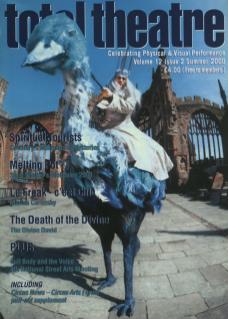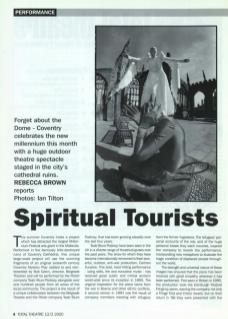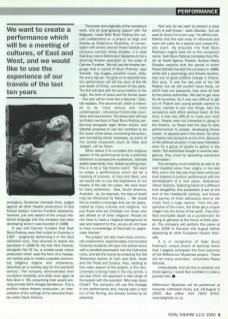This summer Coventry hosts a project which has attracted the largest Millennium Festival arts grant in the Midlands. Performed in the famously blitz-destroyed ruins of Coventry Cathedral, this unique large-scale project will use the surviving fragments of an original sixteenth century Coventry Mystery Play (added to and reinterpreted by Bob Eaton, director, Belgrade Theatre) and will be performed by the Polish company Teatr Biuro Podróży alongside over one hundred people from all areas of the local community. The project is the result of a unique collaboration between the Belgrade Theatre and the Polish company Teatr Biuro Podróży, that has been growing steadily over the last four years.
Teatr Biuro Podróży have been seen in the UK in a diverse range of theatrical guises over the past years. The show for which they have become internationally renowned is their powerful, outdoor, anti-war production, Carmen Funebre. This bold, hard-hitting performance – using stilts, fire and evocative music – has received great public and critical acclaim worldwide since its inception in 1993. The original inspiration for the piece came from the war in Bosnia and other ethnic conflicts. A second version in 1994 was the result of company members meeting with refugees from the former Yugoslavia. The refugees' personal accounts of the war, and of the huge personal losses they each incurred, inspired the company to rework the performance, incorporating new metaphors to illustrate the tragic condition of displaced people throughout the world.
The strength and universal nature of these images has ensured that the piece has been received with great empathy wherever it has been performed. First seen in Britain in 1995, the production took the Edinburgh Festival Fringe by storm, earning the company not only a Fringe First and Critics' Award, but on their return in '96 they were presented with the prestigious Scotsman Hamada Prize, judged against all other theatre productions of that festival season. Carmen Funebre represents, however, just one aspect of the unique theatrical language that the company has been developing since it was founded in 1988.
It was with Carmen Funebre that Teatr Biuro Podróży were first invited to Coventry in 1997 – poignantly performing it in the city's cathedral ruins. They returned to repeat this spectacle in 1998 for the Arts Alive Festival, alongside Not Of Us, a smaller-scale indoor production which used the form of a mediaeval mystery play to create a parable concerning religious dogma and intolerance, described as 'a morality play for the twentieth century’. The company demonstrated their consistent versatility and skills once again at Arts Alive in '99, presenting their award-winning comedy Drink Vinegar Gentlemen. This is another indoor theatre production, an interpretation of the writings of the absurdist Russian writer Daniil Kharms.
The power and originality of the company's work, and an ever-growing rapport with the Belgrade, made Teatr Biuro Podróży the natural collaborators on a project as large and diverse as Millennium Mysteries. In conversation with artistic director Pawel Szkotak and company member Marta Strzalko, it is clear that they intend Millennium Mysteries to be a stunning theatre spectacle on the scale of Carmen Funebre. ‘We will use the theatre language that is typical of Biuro Podróży,' says Szkotak, 'big images, powerful music, stilts, fire and a big set.’ He goes on to describe how the performance will tell the story of the life and death of Christ, comprised of two parts. The first will deal with the annunciation to the virgin, the birth of Jesus and his former years – ‘this part will be more like a fairytale', Szkotak explains. The second half, which is intended to be more serious and more contemporary, will portray Christ's trial, crucifixion and resurrection. The production will see six Polish members of Teatr Biuro Podróży performing alongside eight British actors, and Szkotak proposes to use two narrators to be the voice of the show, connecting the action, and translating where necessary, as some of the central characters (such as Mary and Joseph), will be Polish.
When asked if he considers the religious aspect of the performance to be a potential deterrent to prospective audiences, Szkotak states adamantly that, before anything else, this is to be a 'big theatre event'. 'We want to create a performance which will be a meeting of cultures, of East and West, and we would like to use the experience of our travels of the last ten years. We have been to many continents – Asia, South America, Australia – so, for example, the idea of death may be influenced by Mexico... We would like to create a message that can be appreciated by many cultures and religions, not just those who are Christian but those who are atheist or of other religions. People do not have to have a religious background to see and respond to this, as you do not have to have a knowledge of Denmark to appreciate Hamlet.’
The project will also have local community involvement. Approximately one hundred Coventry residents will open the performance with a candlelit procession into the Cathedral ruins, and set the scene by enacting the Old Testament stories of Cain and Abel, Noah and the Flood and Exodus. Also, relating to this wider aspect of the project, a film documentary is being made in the city centre, a Vox pop which will approach a vast range of the people with the question, 'Who was Jesus Christ?' The company will use this footage in the performance and, having seen a test run of the filming, are already excited by its potential.
‘Not only do we want to present a story which is well known,’ adds Szkotak, ‘but we want to show it in a new way.’ He affirms confidently that this vast array of influences and input will make for a special and unique theatre event. My enquiries into Teatr Biuro Podróży's origins lead me to the company's name. Teatr Biuro Podróży translates from Polish as Travel Agency Theatre. Actress Marta Strzalko explains that the period in which Pawel Szkotak founded the company in 1988, whilst still a psychology and theatre student, was one of great political change in Poland. She says, 'It was the last year of the Old Poland, but we still couldn't travel freely, we didn't have our passports, they were all held by the police authorities. We had to get visas for all countries. So it was very difficult to get out of Poland and young people wanted to travel, wanted to see new things. Also the company's work offers spiritual travel. At this time, it was very difficult to make your work seen. People were not interested in going to the theatre, so Pawel had the idea to take performances to people, developing shows outside – in squares and in the street. No other company was doing this at the time. Because of the political situation it had been forbidden even for a group of people to gather in the street. The authorities thought it could be dangerous, they could be spreading subversive information.’
The company could certainly be said to be well travelled since their origins in the late 80s, and in the last year they have continued their interest in outdoor performance with the development of a new piece, Selenausci (Moon Sailors). Exploring travel of a different kind altogether, this production is set at the end of the nineteenth century, and follows the journey of three astronauts shot to the moon from a huge cannon. From the perspective of the moon, the three get a unique insight into the future of the Earth. They then face inevitable death as a punishment for daring to glimpse at the future of their planet. The company will perform this piece at Expo 2000 in Hanover this August before appearing at other European theatre festivals.
It is in recognition of Teatr Biuro Podróży's unique brand of spiritual travel that I eagerly anticipate the final outcome of the Millennium Mysteries project. ‘There will be many surprises,' concludes Pawel Szkotak.
Undoubtedly. And yet this is certainly one travel agency I would feel confident to take a journey with.
Millennium Mysteries will be performed at Coventry Cathedral Ruins 18 July – 5 August 2000. www.belgrade.co.uk


